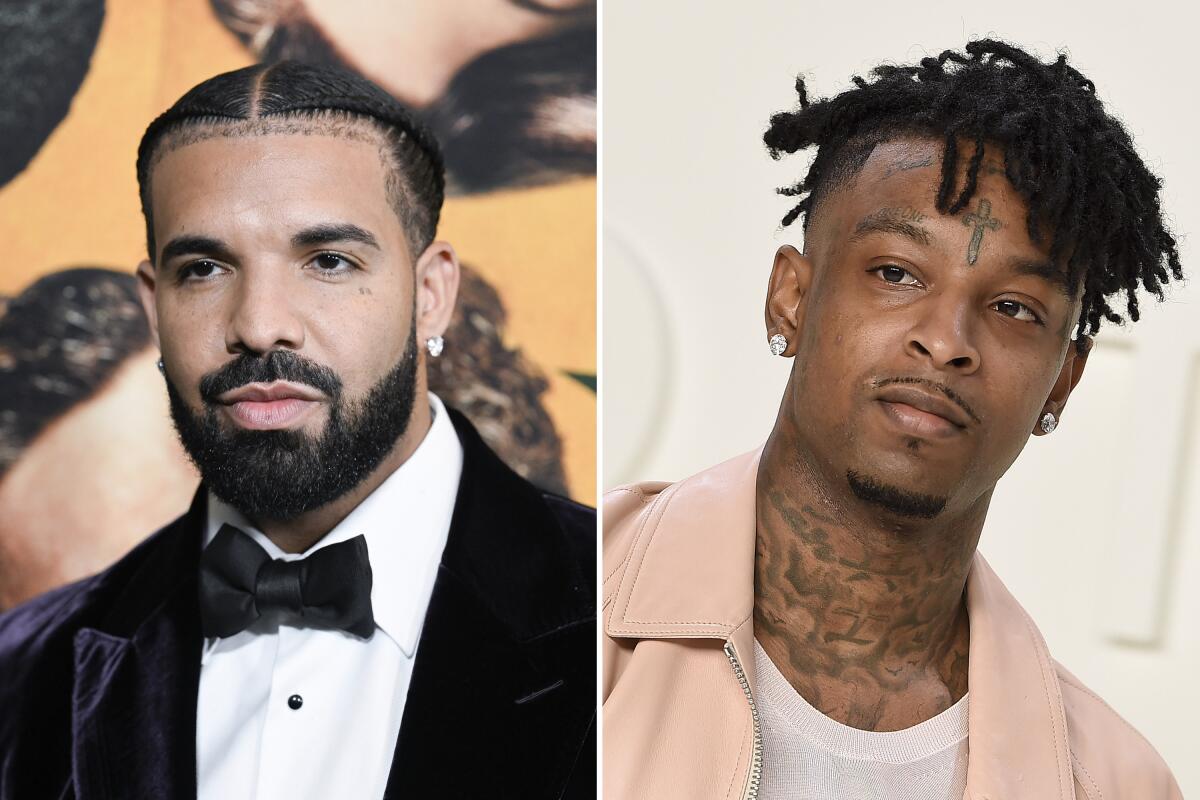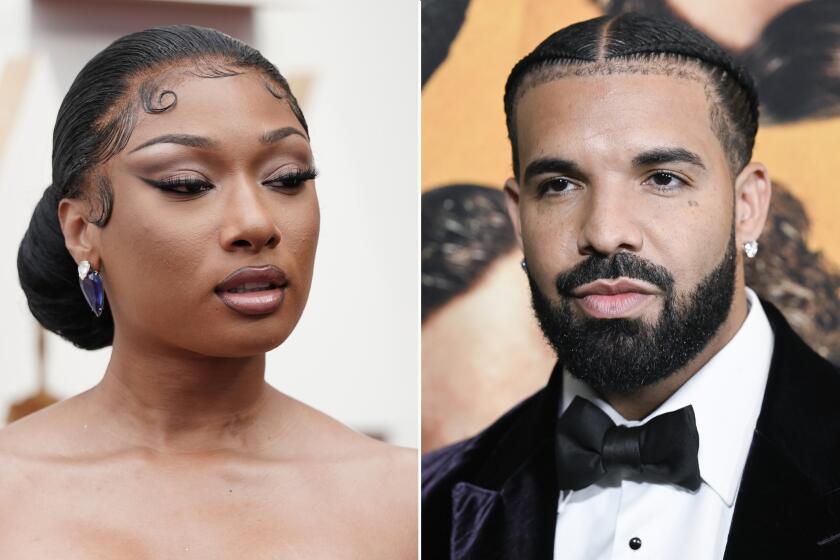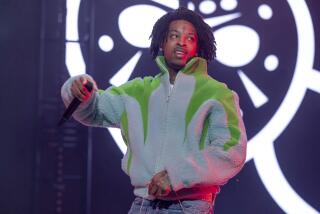Drake, 21 Savage hit with temporary restraining order in Vogue trademark lawsuit

- Share via
Drake and 21 Savage have been hit with a temporary restraining order following their use of Vogue trademarks to promote their new album, “Her Loss.” The order comes after Vogue owner Condé Nast filed a $4-million copyright infringement lawsuit against the recording artists, contending that the faux collaboration they touted with the fashion magazine was unauthorized.
The “Circo Loco” rappers have been directed to halt use of the magazine‘s trademarks and remove from Instagram and other social media the posts featuring them on the Vogue-branded covers they produced, as required by a temporary restraining order issued by a federal court on Wednesday. That’s when Vogue notched its first small victory in the lawsuit, which it filed Monday in U.S. District Court for the Southern District of New York.
Federal Judge Jed S. Rakoff on Wednesday sided with Condé Nast — formally Advance Magazine Publishers Inc. — in its arguments of “sufficient proof” that the hip-hop stars and their communications firm Hiltzik Strategies used the magazine’s registered U.S. trademarks and likeness of Editor in Chief Anna Wintour without authorization to falsely promote the album, according to a copy of the restraining order obtained Friday by the Los Angeles Times.
Drake’s long-term attorney Larry Stein, who also represents 21 Savage in the case, declined to comment Friday, citing pending litigation. Representatives for Hiltzik Strategies also declined to comment.
Publisher Condé Nast sues hip-hop stars Drake and 21 Savage for distributing fake magazines that allegedly infringed on Vogue magazine’s trademark.
The “On BS” and “Privileged Rappers” recording artists — real names Aubrey Drake Graham and Shéyaa Bin Abraham-Joseph — and their team have been accused of trademark infringement after they mocked up fake Vogue covers, shared them on social media and issued counterfeit versions of the magazine late last month, Condé Nast’s complaint said.
The two also posted images of the manufactured cover in a since-removed Oct. 30 Instagram post in which they announced themselves as the magazine’s monthly cover stars and suggested that editor Wintour gave them her coveted stamp of approval by thanking her for her “love and support on this historic moment.” Several news outlets and fans interpreted the publicity stunt as fact, Condé Nast argued.
The publisher is seeking at least $4 million in statutory damages and treble the rappers’ profits from the sales of “Her Loss” and the counterfeit magazine, or triple their awarded damages, whichever is greater.
While the subject of damages was not addressed in the temporary restraining order, the judge agreed that order “is necessary ... to protect the public from confusion, deception, and mistake, and to protect Condé Nast from immediate irreparable injury,” in accordance with the Lanham Act. The act provides a national system for trademark registration and protects owners of a federally registered mark against the use of similar marks.
“No other order is adequate to achieve this purpose,” the order said.
Megan Thee Stallion goes off on Drake’s new song lyrics making light of Tory Lanez allegedly shooting her in the feet. Lanez faces trial Nov. 28.
The order temporarily bars Drake, 21 Savage and Hiltzik from “using, displaying, disseminating, or distributing copies or images” of the counterfeit magazine, counterfeit cover, images of Wintour and using the Vogue mark “or any mark that is confusingly similar to, or a derivation or colorable imitation” for commercial purposes, including advertisement and promotion of the album.
The rappers and Hiltzik were directed to take down and remove existing online and social media posts on any websites or accounts under their ownership, control or direction. And, after street teams handed out copies and plastered the images of the mocked-up mag in cities across the United States, the defendants were ordered to remove public displays and circulation of the existing physical print posters and counterfeit magazines.
“Condé Nast has a likelihood of success on its claims for federal and common law trademark infringement, false designation of origin and unfair competition, false endorsement, dilution, false advertising and violation of [New York business laws],” the order said.
The first COVID-era dance album that actually sounds like catching a superflu at a warehouse party, it’ll likely be the most divisive record of his career.
A hearing has been set for 3 p.m. Nov. 22 in U.S. Court in New York for the defendants — or their attorneys — to appear and show cause as to why Condé Nast shouldn’t be granted a preliminary injunction and extension of the temporary restraining order.
And Condé Nast must post a preliminary injunction bond for $10,000 to cover any expenses incurred by the defendant if it is determined that the injunction should not have been granted. Meaning, if the judge declines to grant the injunction, the defendants are allowed to file a claim against the bond seeking compensation for their court fees, associated costs and sustained damage.
Drake, 21 Savage and Hiltzik are required to file a response to the temporary restraining order by Nov. 20. They plan to file a response to the temporary restraining order in a timely manner, according to a person familiar with the case who was not authorized to discuss it publicly.
Representatives for Condé Nast did not immediately respond Friday to The Times’ request for further comment.
More to Read
The biggest entertainment stories
Get our big stories about Hollywood, film, television, music, arts, culture and more right in your inbox as soon as they publish.
You may occasionally receive promotional content from the Los Angeles Times.














